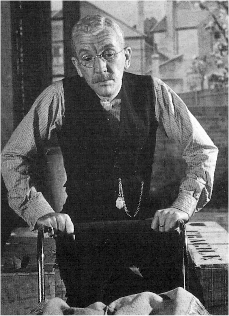This Happy Breed
It was written in 1939 but, because of the outbreak of World War II, it was not staged until 1942, when it was performed on alternating nights with another Coward play, Present Laughter.A number of scenes are reminiscent of previous Coward works, such as Cavalcade (1931) or the short play Fumed Oak from Tonight at 8.30 (1936).The producer Binkie Beaumont originally wanted to stage Present Laughter on its own, but Coward insisted that, given the political situation at the time, it should be played alternately with the more sombre This Happy Breed.The original script called for the abdication speech of King Edward VIII to be heard on the radio by the Gibbons family in Act 3 scene 1, but the Lord Chamberlain (Britain's official play censor until 1968) objected to its inclusion, citing the embarrassment it would cause any member of the royal family who happened to see the play.[3] Coward departed for Paris to meet Jean Giraudoux, who wanted the playwright to set up a Bureau of Propaganda and serve as a liaison with the Commissariat d'Information.Winston Churchill advised Coward that he could do more for the war effort by entertaining the troops and the home front than by attempts at intelligence work: "Go and sing to them when the guns are firing – that's your job![6] This Happy Breed and Present Laughter were finally staged in September 1942 in Blackpool[7] on Coward's wartime tour of Britain after he returned to acting.Ethel expresses her relief that her husband, Frank, has survived army service in World War I and her pleasure at moving into their new home.After Christmas dinner the grown-ups (Frank and Ethel, Ethel's mother, Mrs Flint, and Frank's sister, Sylvia) have retired to another room to leave the young people (Frank and Ethel's children: Vi, "a pleasant nondescript-looking girl of twenty"; Queenie, "a year younger... prettier and a trifle flashy"; and Reg, aged eighteen, "a nice-looking intelligent boy", Reg's friend Sam and Queenie's friend Phyllis) alone.The Times, noting that This Happy Breed had opened the night after the London première of Present Laughter, commented, "both plays, though widely separated in mood and kind, are successful, the one attaining to brilliant comedy, the other creating and sustaining an interest in a family of the lower middle class which may fairly be called absorbing.... Mr Coward keeps firm control of his narrative and in his own part occasionally permits himself to speak for an England which, though tired, is still possessed of an invincible stamina."[11] The Manchester Guardian thought some of the scenes too long, but added "the author's skill is shown in each one, unabated and breaking fresh ground; the play obviously moved and excited the audience, and we must admit, once again, that Mr Coward remains one of the most remarkable men of the theatre of our time.[13] A 1944 film adaptation, also called This Happy Breed, was directed by David Lean and starred Robert Newton and Celia Johnson.
This Happy Breed (film)Noël CowardPresent LaughterBlithe SpiritEnglish peopleJohn of GauntmonologueShakespeareRichard IIGeneral Strike of 1926crystal radioupper middle classCavalcadeFumed OakTonight at 8.30Binkie Beaumontabdication speechEdward VIIILord ChamberlainPolandJean GiraudouxliaisonWinston ChurchillBlackpoolGladys CalthropThe VortexClaphamSouth LondonRule, Britannia!abdication broadcastMentonNeville ChamberlainMunich agreementJudy CampbellJoyce CareyGerald CaseJennifer GrayDennis PriceBeryl MeasorJames DonaldThe TimesThe Manchester GuardianThe Daily ExpressThis Happy BreedDavid LeanRobert NewtonCelia JohnsonBBC Radio 4John MoffattRosemary LeachAnna CropperDoris HareTIME magazineThe ObserverSinclair-StevensonLondon Calling!On with the DanceThis Year of GraceWords and MusicSet to MusicSigh No MoreOh, Coward!Cowardy CustardBitter SweetConversation PieceOperettePacific 1860Ace of ClubsAfter the BallSail AwayThe Girl Who Came to SupperThe Rat TrapI'll Leave It to YouThe Better HalfThe Young IdeaHay FeverFallen AngelsEasy VirtueThe Queen Was in the ParlourSemi-MondeThis Was a ManSiroccoThe MarquiseHome ChatPrivate LivesPost-MortemDesign for LivingPoint ValainePeace in Our TimeSouth Sea BubbleRelative ValuesQuadrilleNude with ViolinLook After Lulu!Waiting in the WingsSuite in Three KeysIn Which We ServeBrief EncounterThe Astonished HeartPomp and CircumstancePresent IndicativeFuture IndefiniteThe Noël Coward DiariesTonight Is OursWe Were DancingMeet Me TonightPretty PollyRed PeppersHigh Spirits